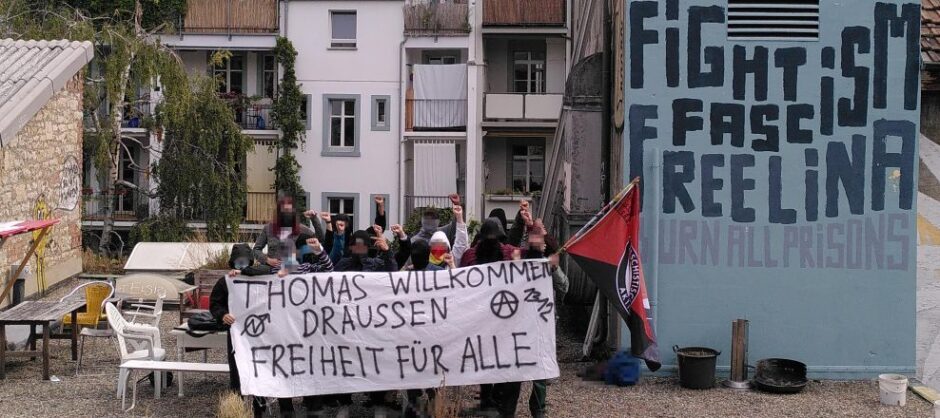-
Recent Posts
- Uniklinik Freiburg plant 350 Stellen abzubauen – Gewerkschaft verdi kündigt harten Widerstand an!
- Osthang weiterhin von Räumung bedroht – „Wir versuchen das weiterhin lebendig zu halten“- sagt die Bürger*innen-Inititative
- Kommentar zum Urteil im Fall Mahdi ben Nacer – „Formal ein Erfolg- dennoch anerkennt BGH nicht die rassistische Dimension!“
- „Free all Antifas!“ – Sprechchöre im Gerichtssaal – Der Prozess gegen Antifaschist:innen vor dem OLG Düsseldorf hat begonnen!
- Silvesterkundgebung vor Freiburger Gefängnis – „Es fehlen die Gefangenen!“: ein atmosphärischer Rückblick
-
Archives
- Januar 2026
- Dezember 2025
- November 2025
- Oktober 2025
- September 2025
- Juli 2025
- Juni 2025
- Mai 2025
- April 2025
- März 2025
- Februar 2025
- Januar 2025
- Dezember 2024
- November 2024
- Oktober 2024
- September 2024
- August 2024
- Juli 2024
- Juni 2024
- Mai 2024
- April 2024
- März 2024
- Februar 2024
- Januar 2024
- Dezember 2023
- November 2023
- Oktober 2023
- September 2023
- August 2023
- Juli 2023
- Juni 2023
- Mai 2023
- April 2023
- März 2023
- Februar 2023
- Januar 2023
- Dezember 2022
- November 2022
- Oktober 2022
- September 2022
- August 2022
- Juli 2022
- Juni 2022
- Mai 2022
- April 2022
- März 2022
- Februar 2022
- Januar 2022
- Dezember 2021
- November 2021
- September 2021
- August 2021
- Juli 2021
- Juni 2021
- Mai 2021
- April 2021
- März 2021
- Februar 2021
- Januar 2021
- Dezember 2020
- November 2020
- Oktober 2020
- September 2020
- August 2020
- Juli 2020
- Juni 2020
- Mai 2020
- April 2020
- März 2020
- Februar 2020
- Januar 2020
- Dezember 2019
- November 2019
- Oktober 2019
- September 2019
- August 2019
- Juli 2019
- Juni 2019
- Mai 2019
- April 2019
- März 2019
- Februar 2019
- Januar 2019
- Dezember 2018
- November 2018
- Oktober 2018
- September 2018
- Juli 2018
- Juni 2018
- Mai 2018
- April 2018
- März 2018
- Februar 2018
- Januar 2018
- Dezember 2017
- November 2017
- Oktober 2017
- September 2017
- August 2017
- Juli 2017
- Juni 2017
- Mai 2017
- April 2017
- März 2017
- Februar 2017
- Dezember 2016
- November 2016
- Oktober 2016
- September 2016
- August 2016
- Juli 2016
- Mai 2016
- April 2016
- März 2016
- Februar 2016
- Januar 2016
- Dezember 2015
- November 2015
- Oktober 2015
- September 2015
- August 2015
- Juli 2015
- Mai 2015
- April 2015
- März 2015
- Februar 2015
- Januar 2015
- Dezember 2014
- November 2014
- Oktober 2014
- September 2014
- August 2014
- Juli 2014
- Juni 2014
- Mai 2014
- April 2014
- März 2014
- Februar 2014
- Januar 2014
- Dezember 2013
- November 2013
- Oktober 2013
- September 2013
- August 2013
- Juli 2013
- Juni 2013
- Mai 2013
- April 2013
- März 2013
- Februar 2013
- Januar 2013
- Dezember 2012
- November 2012
- Oktober 2012
- September 2012
- August 2012
- Juli 2012
- Juni 2012
- Mai 2012
- April 2012
- März 2012
- Februar 2012
- Januar 2012
- Dezember 2011
- November 2011
- Oktober 2011
- September 2011
- August 2011
- Juli 2011
- Juni 2011
- Mai 2011
- April 2011
- März 2011
- Februar 2011
- Januar 2011
- Dezember 2010
- November 2010
- Oktober 2010
- September 2010
- August 2010
- Juli 2010
- Juni 2010
- Mai 2010
- März 2010
- Februar 2010
- Januar 2010
- Dezember 2009
- November 2009
- Oktober 2009
- August 2009
- Juli 2009
- Juni 2009
- Mai 2009
- September 2008
- August 2008
- Juli 2008
- Mai 2008
- April 2008
- März 2008
- Februar 2008
-
Recent Comments
Archiv des Monats: Oktober 2013
Sicherungsverwahrte protestieren!
In der JVA Freiburg (http://www.jva-freiburg.de) sitzen zur Zeit rund 55 männliche Sicherungsverwahrte. Angesichts der schon an anderer Stelle erwähnten Mängel (http://de.indymedia.org/2013/09/348487.shtml) regt sich weiter Unmut unter den Freiburger Verwahrten. Vorfälle der jüngsten Zeit Am 08.10.2013 wurden in allen Zellen … Weiterlesen
Veröffentlicht unter Texte aus der SV
Schreib einen Kommentar
Knast-Shop Massak – Ärger ohne Ende?
Schon in den zurückliegenden Jahren berichtete ich mehrfach über die Firma Massak Logistik GmbH (http://www.massak.de) und den massiven Ärger unter Gefangenen, was die Belieferung mit Nahrungsmitteln angeht (http://de.indymedia.org/2010/05/280395.shtml, http://de.indymedia.org/2011/12/321287.shtml). In der JVA Freiburg findet die Geschichte nun ihre Fortsetzung. … Weiterlesen
Veröffentlicht unter Strafvollzug
2 Kommentare
17 years in prison – A balance sheet
June 6, 2013 After being imprisoned for almost 17 years nonstop, from the 8th of July 2013 onward I will be held in preventative detention (Sicherungsverwahrung, a form of “security detention” in Germany for convicts who have served full terms, … Weiterlesen
Veröffentlicht unter englische Texte
Schreib einen Kommentar
Nazi-Law in Germany 2013
In 1933 the German Nazis created a new law, called ‚Preventive Detention‘ (P.D.), which allows the state to keep people inside prison after they have finished their sentence. The courts in Eastern Germany forbid this law, because it was a … Weiterlesen
Veröffentlicht unter englische Texte
Schreib einen Kommentar
